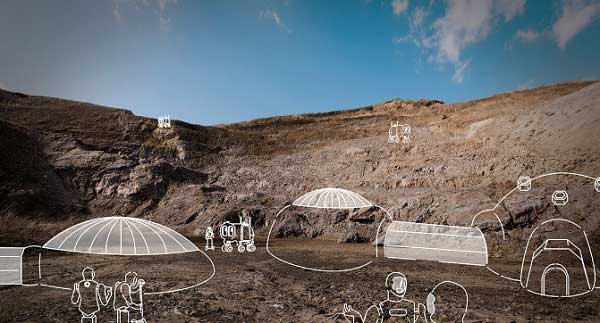The idea would mean ditching the traditional means tested benefits system.



Surging productivity and the general rise in incomes it brings would be welcome, of course, but that isn’t sufficient. The same questions being raised about the advance of robotics in the workplace apply to machine learning. While new jobs would be created, many existing jobs — from doctors and financial advisers to translators and call-center operators — are susceptible to displacement or much-reduced roles. No economic law guarantees that productivity growth benefits everyone equally. Unless we thoughtfully manage the transition, some people, even a majority, are vulnerable to being left behind even as others reap billions.
Whether it’s for the better and for the many is up to human intelligence.

Utilizing new mobile application technology, researchers at The University of New Mexico found that medical cannabis provides immediate symptom relief across dozens of health symptoms with relatively minimal negative side effects.
In two recent studies titled, “Patient-Reported Symptom Relief Following Medical Cannabis Consumption,” and “Effectiveness of Raw, Natural Medical Cannabis Flower for Treating Insomnia under Naturalistic Conditions” published in the journals, Frontiers in Pharmacology and Medicines, respectively, UNM Department of Psychology Associate Professor Jacob Miguel Vigil and UNM Department of Economics Assistant Professor Sarah See Stith, document that patients experienced statistically and clinically significant therapeutic benefits when they used cannabis for symptoms ranging from chronic pain to insomnia.
These studies analyzed data collected with the Releaf App, developed by co-authors Franco Brockelman, Keenan Keeling and Branden Hall and currently, the largest repository of user-entered information on the consumption and effects of cannabis use in the United States with nearly 100,000 recorded user sessions.

Data centers are the new oil refineries, argues The Economist. Where black sludge and steam once marked the beating heart of the economy, now blinking servers laced with fiber optic cables indicate where the action is.
Biotechnology — like all other industries — must adapt. Synthetic biology teams that embrace modern tools like cloud computing, professionally built software, and laboratory automation will save time, reduce errors, streamline complex workflows, and maintain their agility in the digital economy. Those who fail to adopt new tools will be primed for disruption.
Software is already an integral part of biological research, but most scientific apps lag far behind the rest of the digital frontier. As the software giant Autodesk puts it:


TOKYO, Sept. 6, 2018 (ANA HD/JAXA PR) — ANA HOLDINGS INC. (hereinafter ANA HD) and Japan Aerospace Exploration Agency ( JAXA ) are proud to announce the launch of “AVATAR X,” a multi-phased program to revolutionize space exploration and development using real-world Avatars (*1).
AVATAR X aims to capitalize on the growing space-based economy by accelerating development of real-world Avatars that will enable humans to remotely build camps on the Moon, support long-term space missions and further explore space from afar.
AVATAR X is part of “ANA’s AVATAR Vision (*2),” a breakthrough endeavor to advance and pioneer real-world Avatar technologies, and JAXA ‘s new research and development program “J-SPARC” ( JAXA Space Innovation through Partnership and Co-creation). Together with a growing list of public and private partners, AVATAR X hopes to catalyze new space-based businesses that will provide key services and an unprecedented level of access to space.

New research confronts the elephant in the room—the ‘trilemma’ of population growth, economic growth and environmental sustainability—and reveals the vast incompatibility of current models of economic development with environmental sustainability.
Using data collected from across the globe, national economies and natural resource use were closely examined by an international team of scientists using a mathematical model.
The results suggest that as long as our economic system retains its current structure, and if population growth continues, both high- and low-income countries will fail to achieve environmental sustainability.

Drones have, as with most technologies, a wide spectrum of usefulness. What one uses to pick fruit, another will use to kill a human being. Companies are increasingly looking to drone technology to solve big and small problems but what does the future hold for this helpful and lethal technology?
Kevin Bolen, Principal, Innovation & Enterprise Solutions, KPMG is paid to know such things and spoke recently about the regulation reviews surrounding drones; “Both the US and UK have similar regulations in place around the flying of drones, which restrict commercial applications. Drones must weigh less than 55 lbs, and be flown within line of sight of the pilot, in daylight, below 400 feet and away from restricted airspace (e.g., airports). A pilot can only control one drone at a time. With so many restrictions, the primary utility now is for video streaming/recording; cameras are lightweight, and drones can easily access areas that are costly or unsafe for humans. [Streaming/recording] can prove helpful for inspection of large assets (e.g., oil rigs or bridges) or conducting an inventory of livestock or other materials.”
Despite limitations, drone use is increasing and could add to GDP of most countries (2% for the UK alone per PwC research). When asked, Bolen agrees companies will likely rent more drones rather than buy them. In some cases owning will make more economic sense but the key is to think beyond your needs right now and partner with the right people; “As the demand for drones increases, the scale and efficiency of the companies servicing this demand will grow and they will continue to optimize the performance and range of offerings faster than an individual firm could handle on their own.” Bolen also believes that specialized licenses will be commonplace for drone operators as with the trucking industry.
Satellite Constellations to Bring Global Internet Coverage (SpaceX, OneWeb, Boeing,…):
In this video, we’ll be discussing global internet connectivity initiatives based in space, more specifically – low and mid-Earth orbit through the use of satellite constellations.
[0:35–2:30] Starting off we’ll discuss how these satellites will communicate with the ground and the internet providing satellites from Iridium and ViaSat, that act as a proof of concept and validate satellites as a means for internet connectivity.
[2:30–5:50] Following that we’ll take a look at, current satellite constellations in development from SpaceX, OneWeb, Boeing, and others.
[5:50–07:40] To conclude we’ll discuss, the manufacturing and economics of these satellite constellations.

In 2018, Canada is ranked tenth in the world in nominal GDP. It is a rich developed country. Despite having an economy that is 11 times smaller than the USA or 7 times smaller than China, Canada has world competitive or world-leading projects in quantum computing, artificial intelligence, molecular nanotechnology, nuclear fusion and nuclear-molten salt.